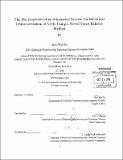The development of an automated system for electrical characterization of cells using a novel force balance method
Author(s)
Su, Hao-Wei
DownloadFull printable version (17.31Mb)
Other Contributors
Massachusetts Institute of Technology. Department of Electrical Engineering and Computer Science.
Advisor
Joel Voldman.
Terms of use
Metadata
Show full item recordAbstract
Dielectrophoresis (DEP), a cell separation technique based on the dielectric properties, has significantly advanced biomedical research in diverse applications ranging from blood stem cells purification to cancer cells isolation from heterogeneous populations. The ability to accurately measure the dielectric properties of individual cells is not only critical for effective sorting applications, but is also advantageous for enhancing the current knowledge of cell biology. This thesis proposes a novel method: the n-DEP spring, which applies an electrical field gradient upon continuously flowing cells to distinguish them based on their individual DEP properties. Specifically, the method uses the equilibrium position originating from the force balance between hydrodynamic and DEP forces to infer the cellular dielectric properties. For thorough DEP characterization, changing different conditions of cells is an essential but time-consuming process which usually takes hours to days. Especially for DEP characterization of time-sensitive events, such as neutrophil activation or cell apoptosis, short characterization time is required. This thesis describes the automation of the fluidic, optics, and electronics components of the DEP characterization system, which shortens the characterization time within an hour. We first demonstrated the automated DEP characterization of a mammalian cell type in thirty-nine conditions within an hour. Subsequently, we characterized the neutrophils with different activation states and successfully found out the right conditions to discriminate the activated neutrophils and non-activated neutrophils. With this system and method, we now have the potential to rapidly screen through a variety of system parameters, and optimize conditions for effective cell sorting.
Description
Thesis (S.M.)--Massachusetts Institute of Technology, Dept. of Electrical Engineering and Computer Science, 2012. Cataloged from PDF version of thesis. Includes bibliographical references (p. 86-90).
Date issued
2012Department
Massachusetts Institute of Technology. Department of Electrical Engineering and Computer SciencePublisher
Massachusetts Institute of Technology
Keywords
Electrical Engineering and Computer Science.